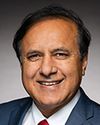Thank you, Minister.
Of course, the minister knew—or should have known—that there are these Afghans who served Canada and who, with their family members, could not get to safety before this moment in time. The minister has known this for a long time now. I have certainly written enough letters to the minister to fill a cabinet drawer full with respect to that. This is not new to the minister. That information was there before the minister, prior to the immigration levels plan that was released.
I bring this to the minister's attention because people's lives are at risk. Until it happens, these people will not get to safety—that is the reality—and the Government of Canada is giving them a death sentence. That's also a reality that they will face. I'm sorry to say that, but that's how people are being treated on the ground.
On a different question, I asked officials for information regarding biometrics. I have the information back to indicate that “3,486 unique applications, representing a total of 10,568 persons, have at least one person on the application waiting to have their biometrics completed as of December 23, 2022.” That means they can't get their biometrics.
Because they cannot get those biometrics, will the minister consider alternatives so that they can get to safety? Can they not do that outside of country and, for some of them, actually in-house when they arrive in Canada?





